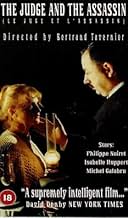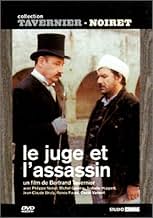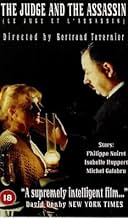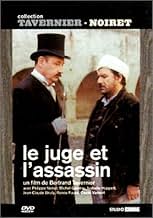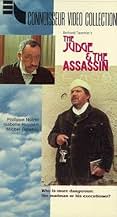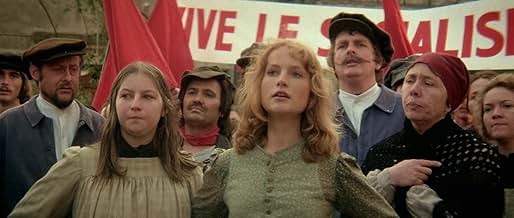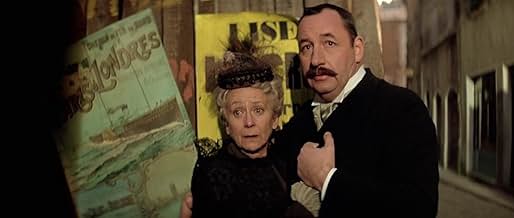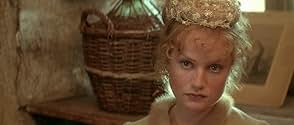IMDb RATING
7.3/10
2.4K
YOUR RATING
An unstable former French Sergeant commits many atrocities. A judge considers how this case could benefit or damage his career.An unstable former French Sergeant commits many atrocities. A judge considers how this case could benefit or damage his career.An unstable former French Sergeant commits many atrocities. A judge considers how this case could benefit or damage his career.
- Awards
- 3 wins & 4 nominations total
Jean-Claude de Goros
- Dr. Dutourd
- (as Jean-Claude de Gorros)
Storyline
Did you know
- TriviaThis is a fairly straight-forward account of the crimes of Joseph Vacher. "Vacher" and "Bouvier" both mean "cowherd" in French. The names of many of the characters - like Lacassagne - have not been changed.
- ConnectionsFeatured in Keskiyön auringon kuvat (1987)
- SoundtracksLa Complainte de Bouvier l'Éventreur
Music by Philippe Sarde
Lyrics by Jean-Roger Caussimon
Performed by Jean-Roger Caussimon
Featured review
And with him,the French cinema regained all that it had lost with the nouvelle vague:magnificent cinematography(I urge everybody to see this film in a movie theater),elaborate screenplays,Clouzot's Renoir's and Duvivier's bite ,all that made once the French cinema great."Le juge et l'assassin " is his sophomore effort ,after "l'horloger de Saint- Paul",but it was one which firmly and finally placed Tavernier among the greatest,most ambitious artists of the French cinema.
First of all,he did with Michel Galabru -who used to play in mediocre comedies - what Claude Chabrol did with Jean Yanne ("le boucher" "que la bete meure") :this actor is playing his lifetime part,revealing a talent which one would never expect from him.
France,end of the nineteenth century;anti-Semitism is rampant :twice ,a poster appears :"La croix (the cross): a paper against the Jews as no one can";Brialy's character:"we all need an outlet for our bad deeds:I have chosen the Jews,because it's safe";Renée Faure,the judge's good mother,serving the "mercy bouillon" to the Poor,provided that they sign a petition against captain Dreyfus .After the 1870 war,France was humiliated and the song a buck officer sings speaks volumes about the loss of Alsace and Lorraine.A world which Zola -whose books were burned- depicted ,where 2,500 children died in the coal mines... The killer killed 12 of them..
This is not a serial killer who comes out of the blue.Tavernier takes time to describe his mind :he was bitten by a rabid dog (or more like as one scene in a church tells us ,he was raped by a priest),he served in the army but was discharged,and mainly the girl he loved did not want him anymore.He tried to kill her and to take his own life but he failed twice,and in the asylum,they wrecked his brain.Although he is a killer,he is actually a political prisoner:he realized that as far his crimes were concerned ,the blame had to be put on a criminal society:in a remarkable scene ,the judge's mother reads the reports concerning the awful crimes as if she 's reading the tittle-tattle of the town.The serial killer identifies himself with Jesus and Joan of Arc ...
In direct contrast to hîm,we have the judge :admirably portrayed by Tavernier's favourite actor ,Philippe Noiret,he epitomizes the bourgeoisie,the man who wants to keep the world as it is;this is a very complex opaque character:nearing 50,he stills lives with his mother,and he's got nasty habits (see the scene when he buggers Isabelle Huppert).
There are a lot of things to say about "le juge et l'assassin":the film successfully recreates the atmosphere of the period,not only by its hints at Dreyfus,at a country which is bent on revenge ,at a Church which feels its power slip away (the priest thundering against "school without God" ,about 10 years after Jules Ferry instituted secular education,and about 10 years before the separation of the Church and the State in France).But it even recreates it with its original songs ,which is quite a feat.We really feel we are in the time machine,and that's the main reason why Tavernier's movie is so precious:no one can find echoes of the seventies in France,which would have dated and marred the film.Even if the socialists appear at the end of the movie,there's no connection with their impending coming in the eighties.
A masterpiece ,Tavernier's best film along with "la vie et rien d'autre".
First of all,he did with Michel Galabru -who used to play in mediocre comedies - what Claude Chabrol did with Jean Yanne ("le boucher" "que la bete meure") :this actor is playing his lifetime part,revealing a talent which one would never expect from him.
France,end of the nineteenth century;anti-Semitism is rampant :twice ,a poster appears :"La croix (the cross): a paper against the Jews as no one can";Brialy's character:"we all need an outlet for our bad deeds:I have chosen the Jews,because it's safe";Renée Faure,the judge's good mother,serving the "mercy bouillon" to the Poor,provided that they sign a petition against captain Dreyfus .After the 1870 war,France was humiliated and the song a buck officer sings speaks volumes about the loss of Alsace and Lorraine.A world which Zola -whose books were burned- depicted ,where 2,500 children died in the coal mines... The killer killed 12 of them..
This is not a serial killer who comes out of the blue.Tavernier takes time to describe his mind :he was bitten by a rabid dog (or more like as one scene in a church tells us ,he was raped by a priest),he served in the army but was discharged,and mainly the girl he loved did not want him anymore.He tried to kill her and to take his own life but he failed twice,and in the asylum,they wrecked his brain.Although he is a killer,he is actually a political prisoner:he realized that as far his crimes were concerned ,the blame had to be put on a criminal society:in a remarkable scene ,the judge's mother reads the reports concerning the awful crimes as if she 's reading the tittle-tattle of the town.The serial killer identifies himself with Jesus and Joan of Arc ...
In direct contrast to hîm,we have the judge :admirably portrayed by Tavernier's favourite actor ,Philippe Noiret,he epitomizes the bourgeoisie,the man who wants to keep the world as it is;this is a very complex opaque character:nearing 50,he stills lives with his mother,and he's got nasty habits (see the scene when he buggers Isabelle Huppert).
There are a lot of things to say about "le juge et l'assassin":the film successfully recreates the atmosphere of the period,not only by its hints at Dreyfus,at a country which is bent on revenge ,at a Church which feels its power slip away (the priest thundering against "school without God" ,about 10 years after Jules Ferry instituted secular education,and about 10 years before the separation of the Church and the State in France).But it even recreates it with its original songs ,which is quite a feat.We really feel we are in the time machine,and that's the main reason why Tavernier's movie is so precious:no one can find echoes of the seventies in France,which would have dated and marred the film.Even if the socialists appear at the end of the movie,there's no connection with their impending coming in the eighties.
A masterpiece ,Tavernier's best film along with "la vie et rien d'autre".
- dbdumonteil
- Mar 9, 2005
- Permalink
- How long is The Judge and the Assassin?Powered by Alexa
Details
- Runtime2 hours 8 minutes
- Sound mix
- Aspect ratio
- 2.35 : 1
Contribute to this page
Suggest an edit or add missing content

Top Gap
By what name was The Judge and the Assassin (1976) officially released in India in English?
Answer
![Watch Bande-annonce [OV]](https://m.media-amazon.com/images/M/MV5BMGRkZTUzMWItY2NmZi00YWFhLTllZTMtZmQzNmFjNmFkY2M5XkEyXkFqcGdeQXRyYW5zY29kZS13b3JrZmxvdw@@._V1_QL75_UX500_CR0)
